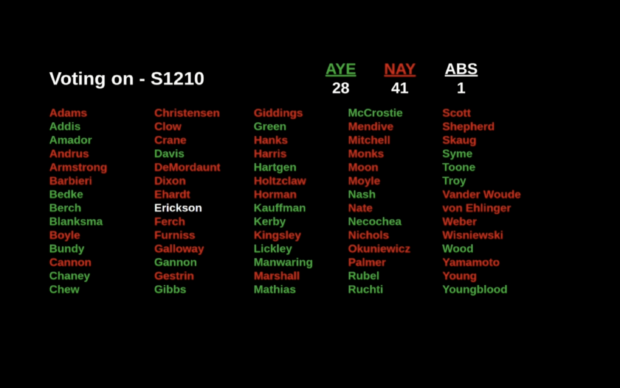The House Tuesday struck down a bill to free up $40.3 million to help schools pay for staff and student COVID-19 tests.
School districts, along with private and charter schools, could have opted into receiving the state-held federal money to pay for voluntary tests. But some House members said they didn’t want more coronavirus testing in schools. Others said Senate Bill 1210 provided too much money for testing, and others yet looped concerns about COVID-19 vaccines — which aren’t approved for children under 16 and weren’t mentioned in the bill — into the half-hour debate.
“This is a very low priority as far as I’m concerned,” said Rep. Karey Hanks, R-St. Anthony.
SB 1210 fell 28-41 after enjoying bipartisan support in the Senate, which passed it on a 26-3 vote last week.

Rep. Barbara Ehardt, R-Idaho Falls, opposed the bill, and read an email from a “distraught” parent whose child had been quarantined three times after coming in contact with another student who tested positive for COVID-19. She disagreed with Democrats and some fellow Republicans, who argued testing is important to keeping students safe and enabling districts to maintain full-time, in-person learning.
“All this is going to do is keep our kids out of school longer. It’s not helping them,” Ehardt said. “It’s not getting them back in school. It’s finding reasons to keep them out.”
Said Caroline Nilsson Troy, R-Genesee, “This has been the strategy that our universities have used in Idaho to stay open. And that’s been very successful and allowed them to quickly contain any outbreaks and identify where the issues are.”
But dissent remained. Rep. Tammy Nichols, R-Middleton, said the money wasn’t needed, and falsely claimed children under 18 “are not really carriers of this, they don’t spread” COVID-19.
She followed that by stoking a baseless fear that the bill would force students to be vaccinated against the coronavirus without parental consent. The bill does not deal with vaccinations, and no coronavirus vaccine has been approved for children under 16 in the U.S.
Other right-wing Republicans, including Reps. Ron Nate of Rexburg and Heather Scott of Blanchard, raised privacy concerns. Nate complained that positive test results would be shared, and Scott questioned if there would be a “pump” of test results “into the CDC,” the Centers for Disease Control.
Rep. Mathew Bundy, R-Mountain Home, said students’ privacy would be well-protected if the funding was approved. Districts could contract out local health care providers to perform the testing, and those providers would ensure individual privacy, he explained.
“That’s one of the ways that this money can be used, and that’s the only one that I’m familiar with,” Bundy said.
Health experts have warned for months that the spread and impact of COVID-19 among children may worsen as new variants spread to Idaho.
Late in the session, the funding request may be dead for the session.
‘We are at a place of pause again’
After closed-door party caucuses, the Senate returned to session just long enough to call another three-day recess.
The Senate is leaving several key pieces of legislation on hold, including a far-reaching tax relief bill and a transportation funding package. But senators say they don’t want to move on these bills until the House completes more work on budgets — bringing the state revenue picture into better focus.
“We are at a place of pause again,” said Senate Majority Leader Kelly Anthon, R-Burley.
The Senate will reconvene at 8 a.m. Friday — with one big item on its calendar already. Senators have said they plan to vote whether to override Gov. Brad Little’s veto of a bill restricting the governor’s emergency powers. The House voted last week to override this veto; the Senate last week failed to override a veto of a second bill limiting emergency powers.
Meanwhile, the House adjourned until Thursday afternoon. The House Ethic Committee will hold a hearing Wednesday to consider a complaint against Rep. Aaron von Ehlinger, R-Lewiston, who is facing an allegation of rape involving a legislative aide.
Idaho Education News reporter Kevin Richert contributed to this report. Idaho Education News covered Tuesday’s hearings remotely.
